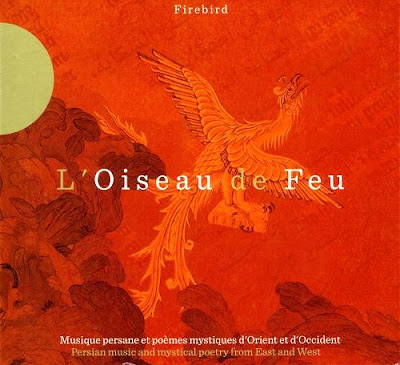Where would you file this CD?
No, not under ‘Stravinsky’ and not even under ‘Classical’. L’Oiseau de Feu (Firebird) is a CD of improvised music and recitations for ney, santour, Eastern percussion, viole de gambe and voice inspired by texts from Sufi poets and Christian mystics. There is not a note of Stravinsky's music on the disc, but there is a connection: his Firebird ballet has its roots in Russian folklore and the legendary bird also appears as the simorgh in Persian mythology, notably in the Farid ud-Din Attar's Sufi masterpiece Conference of the Birds. Hence the title of the CD.
This new release from serial innovators Accords Croisés - sample it here - challenges conventions beyond that of the Firebird as an exclusively Stravinsky property. With its juxtaposition of viol and traditional Persian instruments it challenges an even more rigid convention - the definition of classical music. Despite the presence of a Western classical instrument played by early music specialist Jonathan Dunford, this Firebird is most certainly not classical music; but neither is it traditional Persian or world music. If we must file it somewhere it has to be art music. But there is no convenient space for art music in a record store browser, in a record company’s catalogue, or in concert and broadcast schedules; which should tell us that classical music has a problem with definitions.
Much effort is currently being expended on attracting new and younger audiences to classical concerts. A defining characteristic of rock music is that it does not respect definitions and conventions, yet all the current efforts to attract younger rock audiences are centred on the low-hanging conventions of dress, lighting etc without challenging the more difficult to reach and rigid convention of the definition of classical music. Which is not surprising, as - despite altruistic protestations - the end game is not finding new audiences; it is generating cash from the massive record company back catalogues of conventional classical music and boosting radio ratings and concert hall attendances while maintaining the music establishment’s cosy status quo. Which means any broadening of the repertoire such as the commendable Urban Classics and World Routes concerts at the BBC Proms takes place behind a cordon sanitaire drawn around a dedicated concert, which in the case of tonight's World Routes Prom is also shunted into the 10.00 pm graveyard slot.
Before the social mediarati react with their smart one-liners, let me make clear that I am not suggesting the wholesale dismantling of conventional classical music concert programmes. But I am suggesting that Max Hole and his fellow revisonists are right when they say classical music needs to build bridges to new audiences, but they are wrong in trying to build bridges by dumbing down and tinkering with peripherals. I acknowledge there is little hard evidence to support my brain storming suggestion of broadening the definition of classical, other than the perennial sales success of Jordi Savall's music beyond boundaries and a sold out concert in Berlin some years ago that prefaced Mahler's Ninth Symphony with Johannes Ockeghem's Missa Au Travail suis. But that elusive new audience is becoming increasingly multi-cultural; so how about testing the water with a concert that prefaces Stravinsky's complete Firebird with improvised music and recitations of Sufi and other mystical texts? The standard response of 'that's not box office' can be challenged by citing that Rumi is currently the best selling poet in the U.S despite being a Muslim mystic born in what is now Afghanistan, and that his poetry has been set by luminaries such as Philip Glass, Karol Szymanowski and Jonathan Harvey. If it is futile trying to force this new Firebird into the accepted definition of 'classical', isn't it also futile trying to force new audiences into the same definition?
* L'Oiseau de Feu is on the Accords Croisés label and is performed by ensemble Firebird - see photo above - which comprises Hassan Tabar, Bijan Chemirani zarb & daf, Taghi Akhbari vocals & recitation, Jonathan Dunford basse de viol and Gérard Kurdjian recitation. Texts are by Hafez, Rumi, Maître Eckhart, Vashi Bafqi, St John of the Cross, Aboul Hassan al Nouri, Al-Hallaj and Emir Abdel Kader. The CD is the product of a creative residency at La Cité de la Musique, Marseille and my copy was bought at Prelude Records. Any copyrighted material on these pages is included as "fair use", for the purpose of study, review or critical analysis only, and will be removed at the request of copyright owner(s). Also on Facebook and Twitter.










Comments